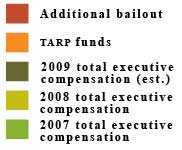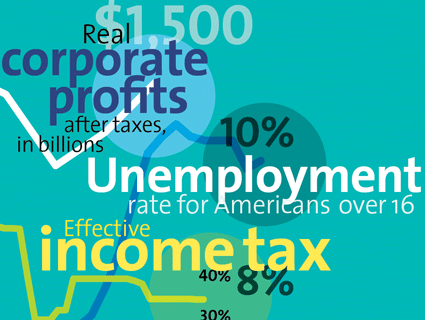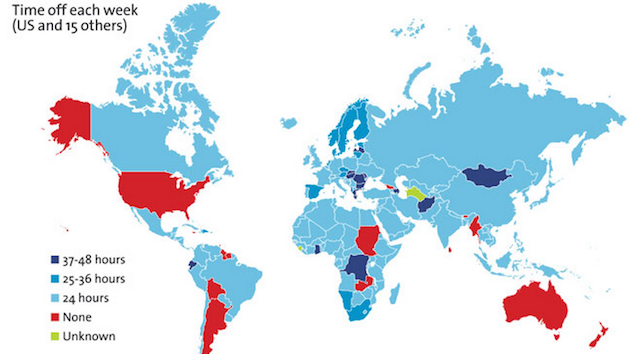
After Goldman Sachs, JPMorgan Chase, and Morgan Stanley announced hefty profits in the fall of 2009, the Obama administration’s pay czar said that he’d cap pay at Citigroup, Bank of America, and five other bailed-out companies. The move was largely symbolic: It capped salaries for only 25 executives, kept big stock bonuses in place, and did nothing to address the culture of rewarding folks who sowed our economic destruction. Below, some of the players who made out like bandits during the bubble and the bailout.
CLICK ON EACH WALL STREET EXEC BELOW TO SEE THEIR COMPENSATION MEASURED AGAINST THEIR FIRM’S BAILOUT

Joseph Cassano, AIG Financial Products Executive, 1987-2008
CLAIM TO FAME: Mr. Credit-Default Swap. In 2008, his unit cost AIG $99 billion. (AIG then paid $1.5 billion in bonuses and awards.)
QUOTE: Before the crash: “It is hard for us…to even see a scenario within any kind of realm of reason that would see us losing $1 in any of those transactions.”
HIS BONUS, 2008: $34 million
HIS HAUL, 2000-2008: $280 million
AIG’S TARP: $69.8 billion
ADDITIONAL BAILOUT: $112 billion

Vikram Pandit, Citigroup CEO, 2007-present
CLAIM TO FAME: Ordered a $50 million private jet, announced huge layoffs, and jacked up credit card APRs—after getting bailed out
QUOTE: Told Congress last February, “My salary should be $1 per year with no bonus.” Didn’t mention that he took $1.6 million in stock options as Citi lost $18.7 billion in 2008.
HIS HAUL, 2008: $10.8 million

Robert Rubin, Citigroup Board of Directors, 1999-2009
CLAIM TO FAME: As Clinton’s treasury secretary, he pushed to overturn regulations prohibiting finance-bank hybrids such as…Citigroup. QUOTE: Wishes he could have reined in Citi but “I don’t know what I could have done” as just a board member.
HIS HAUL, 1999-2009: $124 million
CITI’S TARP: $45 billion ($20 billion repaid)
ADDITIONAL BAILOUT: $328.7 billion

Ken Lewis, Bank of America CEO and President, 2001-2009
CLAIM TO FAME: Okayed $3.6 billion of Merrill Lynch bonuses when buying the troubled firm. Said he’d return $1 million in past earnings, but still gets a $53 million pension.
QUOTE: He’s against regulating “the banks that caused this mess” because they’d been “held accountable by the toughest, most unforgiving master of all: the free market.”
HIS HAUL, 2008: $10 million
HIS HAUL, 2001-2007: $145 million
B of A’s TARP: $45 billion (repaid)
ADDITIONAL BAILOUT: $18.1 billion

Jamie Dimon, JPMorgan Chase CEO and President, 2005-present
CLAIM TO FAME: Cutting comments (“That’s the dumbest thing I’ve ever heard!”) and cutting perks (“You’re a businessman. Pay for your own Wall Street Journal.”)
QUOTE: Over lunch at the Four Seasons: “Corporations can waste a tremendous amount of money. It’s destructive. It’s wrong.”
HIS HAUL, 2008: $19.7 million
HIS HAUL, 2005-2007: $95.7 million
JPMC’S TARP: $25 billion (repaid)
ADDITIONAL BAILOUT: $73.1 billion

Lloyd Blankfein, Goldman Sachs CEO and Chairman, 2006-present
CLAIM TO FAME: Oversaw Goldman’s risky bets on the housing bubble, then turned the investment firm into a bank so it could get TARP money
QUOTE: Says the financial industry looks “self-serving and greedy in hindsight” but that he’s been “doing God’s work.”
HIS HAUL, 2008: $42.9 million
HIS HAUL, 2006-2007: $114.4 million
GOLDMAN’S TARP: $10 billion (repaid)
ADDITIONAL BAILOUT: $43.4 billion

John G. Stumpf, Wells Fargo CEO, 2007-2010 and Chairman, 2010-present
CLAIM TO FAME: Made a tidy $12.6 million in first six months on the job
QUOTE: Asked before Congress about his 2007 pay, he conceded that he’d gotten $67 million in stock—but “at the values that pertained in 2007, which wouldn’t look familiar to you now.”
HIS HAUL, 2008: $13.8 million
WELLS’ TARP: $25 billion (repaid)
ADDITIONAL BAILOUT: $13.4 billion

John J. Mack, Morgan Stanley CEO, 2005-2009, and Chairman, 2005-present
CLAIM TO FAME: Earned the sobriquet Mack the Knife by slashing jobs. His battle cry: “There’s blood in the water; let’s go kill!”
QUOTE: Told Congress, “If you gave me no bonus in the best year, I would still be here,” but later griped that smaller post-bust bonuses led to “an exodus of key people.”
HIS HAUL, 2008: $1.2 million
HIS HAUL, 2005-2007: $77.7 million
MORGAN’S TARP: $10 billion (repaid)
ADDITIONAL BAILOUT: $25.9 billion

John Thain, Merrill Lynch CEO, 2007-2009
CLAIM TO FAME: Asked for a $10 million-plus bonus as Merrill lost $27.6 billion in 2008. Then redid his office for $1.2 million and approved bonuses all around. As the firm’s hidden debts nearly scuttled its sale to B of A, he headed to Vail.
QUOTE: Bonuses were “the right thing to do for…the reward of the people who were performing.”
HIS HAUL, 2007: $83.1 million
MERRILL’S TARP: $10 billion
ADDITIONAL BAILOUT: $6.8 billion
Henhouse, Meet Fox
The bankers on Obama’s team.
GOLDMAN SACHS CEO turned Treasury Secretary Hank Paulson wasn’t the first, or the last, to use the revolving door between Wall Street and Washington. Here’s a short list of current and former Obama officials who got their start in the private sector—many, like Paulson, at “Government Sachs.”
|
OFFICIAL |
ROLE IN WASHINGTON |
PREVIOUS ROLE ON WALL STREET |
|
Neal Wolin |
Deputy secretary of the treasury (Tim Geithner’s No. 2) |
Exec at one of the largest insurance and investment firms |
|
Treasury secretary’s chief of staff |
Goldman Sachs lobbyist |
|
|
Gene Sperling |
Director of the National Economic Council |
Made nearly $900,000 advising Goldman Sachs |
|
Obama’s chief economic adviser |
Made $5 million as managing director of a hedge fund |
|
|
Rahm Emanuel |
White House chief of staff |
Made $16 million as a partner at a Chicago investment bank |
|
Herbert Allison |
Assistant secretary of the treasury (oversees TARP) |
Longtime exec at Merrill Lynch; headed Fannie Mae |
|
Kim Wallace |
Assistant secretary of the treasury for legislative affairs |
Managing director at Barclays Capital and Lehman Brothers |
|
Karthik Ramanathan |
Acting assistant treasury secretary for financial markets |
Foreign exchange dealer at Goldman Sachs |
|
Matthew Kabaker |
Deputy assistant secretary of the treasury |
Made $5.8 million at the Blackstone Group in 2008-2009 |
|
Lewis Alexander |
Counselor to the treasury secretary |
Chief economist at Citigroup; paid $2.4 million in 2008-2009 |
|
Adam Storch |
Managing executive of the SEC’s Division of Enforcement |
VP of Goldman Sachs’ Business Intelligence Group |
|
Lee Sachs |
Counselor to the treasury secretary |
Made more than $3 million at a New York hedge fund |
|
Gary Gensler |
Chairman of Commodity Futures Trading Commission |
18 years at Goldman Sachs, where he made partner |
|
Michael Froman |
Deputy assistant to Obama, deputy nat’l security adviser |
Managing director of a Citigroup investment arm |
These tables first appeared in the January/February 2010 issue of Mother Jones.








